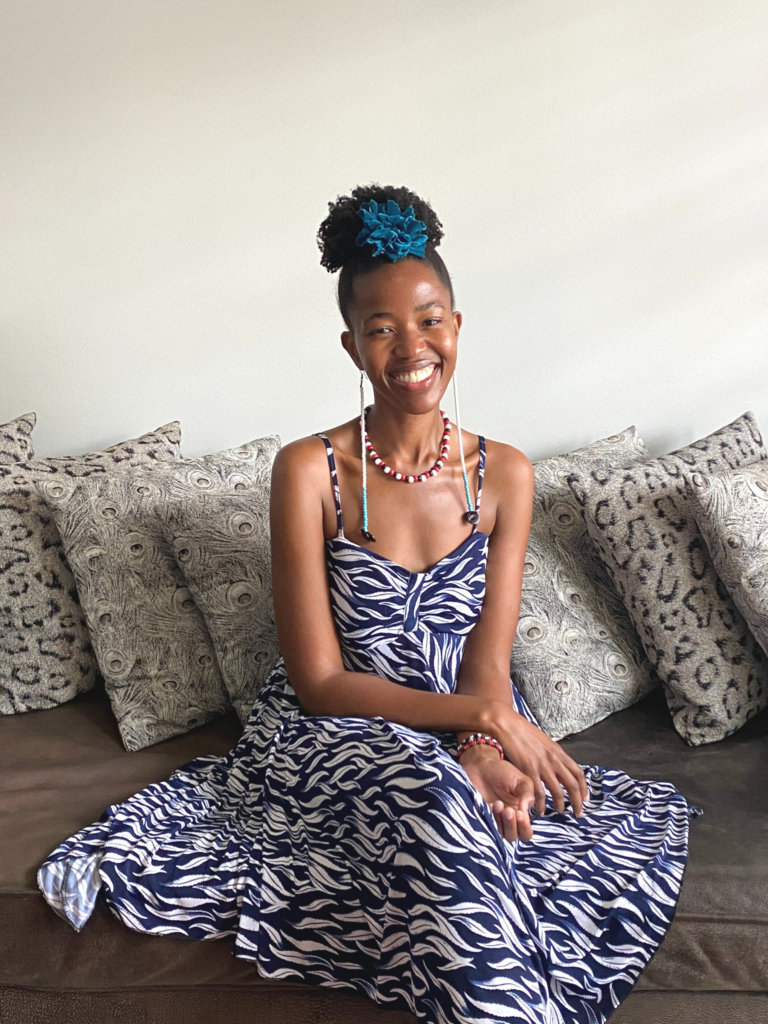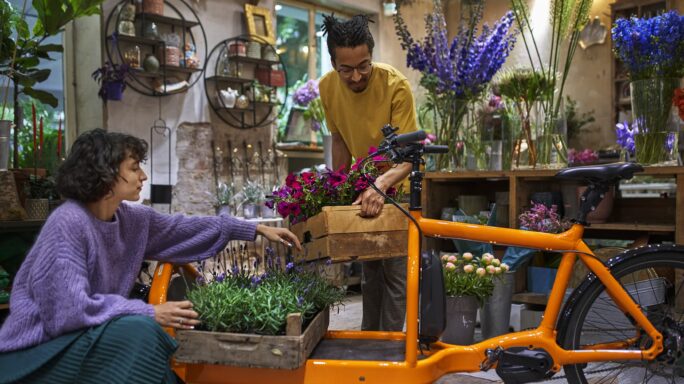Female entrepreneurs on passion, being purpose-driven, and defining success
Three female entrepreneurs share the highs and lows of turning their passion projects into purpose-driven businesses.

Turning a passion into a successful business is the dream for any entrepreneur. But few people talk about how to do this or what goes on behind the scenes.
How do you get started? How should you manage your time and focus? And what about money and funding?
For Naledi Maponopono, it all started with an opportunity.
Having grown up in the Khayelitsha township in the Western Cape, which is notorious for poverty and violent crime, Naledi is no stranger to adversity.
When she was 12 years old, her father, who worked as a security guard, was shot in a robbery and died from his injuries in hospital. Following his death, Naledi’s mother, a domestic worker, moved her family to the Westlake township after her employers bought her a house. Her mother later applied for a Kay Mason Foundation scholarship to the prestigious Vista High School, and Naledi was accepted.
“It was the push I needed to be successful at school because, after that, I got more scholarships and went on to get my Bachelor of Social Science at the University of Cape Town.”
But something bothered Naledi throughout her academic journey.
“English was the medium of instruction in school, and I only had a chance to use my Mother Tongue – Xhosa – when I was in Grade 10. But even then, it was just for singing; we never read books or did things that I felt had more weight, like learning grammar. So, I asked myself, why is my language treated like that? This is where my passion for African languages and education started to build.”
Today, Naledi has turned her passion into a business, Inkwekwezi Language Services, which offers conversational courses in African languages. She is also doing her PhD and researching how better to implement language policies in institutions of higher learning.
Naledi’s dream is to open an African language institute where language specialists will receive training on services such as translation and interpreting in Parliament and government and teaching specialised high school topics in an indigenous language. This will be in support of the National Language Policy Framework that is enshrined in the Constitution and guarantees people the right to speak their preferred language.
“I want to be the training authority that trains and employs African language specialists for the future. It’s ambitious, but I’ve started small and believe it will get there. Much work must be done to undo the injustice of the past where only English and Afrikaans were recognised as official languages. All 11 official languages must be recognised.”
And it all started with that one opportunity – to get a good education.
“I believe that education is very important. It can help a person to escape their conditions, especially in a country like South Africa, where a sordid past of racial discrimination has created a lot of inequality in socio-economic conditions. Education can open so many doors for you; no one else can give you those skills, and no one can take them away from you either – you can use them in whatever way you choose.”
Busisiwe Dhlamini is a perfect example.
Living a fulfilling life
Busi describes herself as a custodian of life’s stories and can’t remember a time when she didn’t love writing.
“Writing is a form of expression that has been my haven ever since I was a child. As undecided as I initially was about my career route, I knew that it had to involve writing and other forms of creative expression – this was non-negotiable.”
Her love for storytelling and playing around with ideas, alongside her interest in social cohesion and life’s events, led her to where she is today: a brand communications professional who helps individuals and organisations to share the stories of their professional work and passion projects.
Busi founded BuhleBakho Communications after getting her BA in Media and Honours in Journalism. She dabbled in media and communications for a few years, which helped her to develop her client consultation and strategic development skills.
“As much as my years of employment offered me the opportunity to do what I loved, there was a part of me that wasn’t quite fulfilled.”
That part of her wanted to connect with the community more and help innovators to position their work and themselves, which is what BuhleBakho Communications is for.
“Ordinary people are doing so many great things, and I believe these creations should be seen, supported, and taken care of just as much as those in the mainstream.”

Ordinary people doing extraordinary things
One such ‘ordinary’ person is Ashley Rose-Innes.
She has been a safe care mom for seven years and, in that time, has provided temporary care to 14 babies in need.
“I have always loved and had a passion for babies and volunteered at a local baby home for many years. Here, I became aware of the great need for more families to step up and care for these vulnerable little ones, which is when I decided to open up my home to them.”
Offering a temporary place of safety to vulnerable babies allows the affected families to get the support they need. For Ashely, it’s important that children remain with their biological family whenever possible and have access to opportunities, so they never have to be separated from their children in the first place.
Her passion for keeping families together lead Ashley to create Loones For Love, a non-profit organisation that aims to provide families in need with clothing, toiletry parcels, and food vouchers so that they can create a supportive home environment in which to raise their children.
Loones For Love also helps mothers compile their CVs and covers the cost of day-care and transport to work. It recently started assisting moms with setting up small businesses in their communities to generate their own income. In her (very limited) spare time, Ashley shares her experiences online and mentors anyone interested in becoming a safe care guardian.
“When I started as a safe care mom, I had no idea I would develop such a passion for family preservation and reunification,” says Ashley. “It’s my hope and prayer to see all families supported and thriving, where children do not need to experience the trauma of being separated from their families unnecessarily.”
“The most rewarding part is knowing the difference that secure attachment can make in a baby’s life. We may not always see the impact we have made, but I know that it is life-changing and that the generations that follow will not be the same because of the love we can provide in those first few critical months and years.”
Never underestimate the power of opportunity
Naledi is a firm believer in the power of opportunities, no matter how big or small – whether someone invests R10 in you or offers a temporary safe space for your children.
“It’s so important never to waste opportunities given to you. If people invest in you, with their time, with their money – even if it’s R10 – you must not take that opportunity for granted because it’s very rare, especially in the South African context where Black people – and Black women in particular – don’t have such support systems.”
It’s also important to Naledi that she uses every opportunity given to her to create opportunities for others.
“When you get given opportunities like I was – being able to go to a prestigious high school that my mother would never have been able to afford as a domestic worker – you have to pay it forward.”
And this is where her passion and purpose come full circle. Through her business, she offers employment and skills development opportunities that will contribute to dismantling youth unemployment in the country.
“When you turn your passion into a business, you can kill two birds with one stone: you live for what you’re passionate about and empower others by creating jobs and transferring skills to people who can work for you. In this way, you transcend your passion. You make other people passionate about what you’re passionate about, and so it builds. You’ll also never get bored because you’re doing what you love and live for, which drives you.”
Trust the journey
As a brand communications professional, Busi has similar advice for entrepreneurs just starting out.
“Be clear on what your purpose is! Stay true to that purpose! Keep listening to that purpose!
Engaging with your purpose and remaining true to that helps you make sense of yourself, first and foremost. This, in turn, empowers your ability and confidence to translate your purpose to the community in any form and through all your evolutions. Purpose is the foundation and essence of your brand’s identity and activities.”
That said, she cautions against getting too caught up in the idea of being a business owner. Instead, the business should be your guiding partner on your journey.
“Allow it to teach you. While it is important to prepare and plan, leave room for the business to show you how the path is actually supposed to come together. I realised quickly that my business was a social purpose happening through me and that I was not the all-knowing master of it,” she laughs.
For Ashley, it’s important to trust the journey: “You never know where life will lead you. What may start as a seed in your heart might end up blooming into something beautiful. Trust the journey.”
For Naledi, it’s the thrill of affirmation that you’re on the right path: “Your passion will wake you up every morning to say, ‘I want to do this’. And every time you get clients that enquire about your services, that passion is affirmed.”
That’s not to say it will be easy
“Entrepreneurship is a tough, crazy, and wonderful adventure of remaining firm in the values and terms and conditions that look after you, finding the right people to collaborate with, working with limited resources, making other people believe in your value, and keeping clients as well as yourself accountable,” says Busi.
Ashley is up before 7 a.m. to take care of ‘Little One’ and works until 9 p.m. most nights to focus on fundraising, sewing clothes for Loones for Love, consulting with families, putting care packages together, training, and admin.
“This work keeps me busy, and it can be extremely exhausting, but I am so passionate about it and am constantly reminded of the blessing that it is to be able to serve these families. I truly consider it one of my life’s greatest privileges to be able to love and care for these precious little ones.”
The most challenging part for Ashley is the goodbyes.
“Although permanency is what we wish for, for our babies (either through adoption or through reunification with biological family members), it is hard to put into words how difficult it is to say goodbye to a child that you have loved as your own for several months (and even sometimes years). Having said that, the cost of a broken heart is what I willingly pay for a child to know healing, love, and safety.”
For Naledi, it’s about persevering against all odds. “I’ve experienced race, class, and gender discrimination based on being a woman, being Black, and coming from a poor background. Unfortunately, in South Africa, and for Black women in particular, our success is always linked to how we overcame poverty. But I always tell myself that I need to keep going, to motivate and be an example to other young girls who one day want to own their own companies and be successful in their careers.”
She adds: “I can’t give up because of all the structures against me. Even if someone undermines me or tries to make me feel like I don’t know what I’m doing, even though I’m highly qualified and have a lot of experience, I soldier on because I’m passionate about what I do. I would love for other young girls who came from the same situation as me to not give up on their dreams because it’s possible to achieve them.”
Top advice from women who have ‘been there, done that’:
On staying humble
- Ashley: “Never underestimate the power of a simple “thank you”. I make a huge effort to personally and publicly thank those who donate to my non-profit. I truly believe that when people feel seen and appreciated, they are more likely to support us again and to tell their friends and family about our work, which helps to create more support. It takes a village, so let’s be that village and support each other in any way we can.”
On staying sane
- Busi: “I persevere by making time to go back to the drawing board to remind myself why I chose the path I chose. I also make reviews and adjustments where necessary. For me, it’s all about paying attention to what the business needs to be at any given moment for each client. It’s important to be flexible instead of chasing rigid consistency. What also helps is exposing myself to entrepreneurs and businesses that inspire me and being surrounded by loved ones that see me and support me. Most importantly, I really love what I do, and I believe in it.”
- Ashley: “I try to keep my weekends for myself and my family, and I take a much-needed break from social media. If any messages or requests come through, I’ll only address them on Monday. I also have separate work and personal phones to enforce boundaries. But most of all, my family and friends who support me and my work are vital to my mental health – I couldn’t do it without them.”
On defining success
- Naledi: “Success is subjective. Everyone has their own life plan or things they want to achieve, so only you will know when you’ve succeeded. For me, success is when I’ve planned something that I want to achieve, and I see it come to fruition. But it’s also an ongoing, multifaceted process. Once I’ve achieved something, there’s always something else that I want to do; there’s always another follow-up, and another follow-up, and another. There’s always room for improvement, either in becoming a better version of yourself or doing something you’ve already done better. I don’t think I will ever say ‘I’ve succeeded’ and be done.”
- Busi: “For me, success is feeling like I’ve offered the best service to my clients and that they are satisfied with my work. Success is also about waking up in the morning, holding more ideas and still feeling inspired to continue my daily work. It’s affirmation that I still have the capacity, permission, and heart to ‘play the game’.”
On money
- Ashley: “Finding something that generates income and not solely relying on donations has been game-changing for me. In my case, I sew and sell children’s clothing, which has allowed me to have the impact we have had thus far.”
On continuous learning
- Busi: “I enjoy learning about the things I am interested in, so every challenge is an opportunity for the student in me to be fed. I like being challenged – the very things that challenge me also fuel my fire. I continue to grow by allowing myself to be teachable and offering myself the grace to be imperfect. I think that when you exist with your business in this way, development becomes a natural result.”





